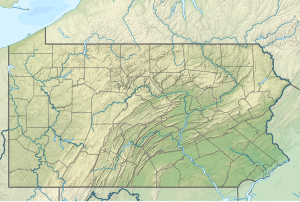Boyer Run (Sewickley Creek tributary)
Appearance
| Boyer Run Tributary to Sewickley Creek | |
|---|---|
| Location | |
| Country | United States |
| State | Pennsylvania |
| County | Westmoreland |
| Physical characteristics | |
| Source | Brush Run divide |
| • location | about 1 mile northeast of Standard Shaft, Pennsylvania[2] |
| • coordinates | 40°10′29″N 079°30′13″W / 40.17472°N 79.50361°W[1] |
| • elevation | 1,152 ft (351 m)[2] |
| Mouth | Sewickley Creek |
• location | about 0.5 miles east of Armbrust, Pennsylvania[3] |
• coordinates | 40°13′09″N 079°32′07″W / 40.21917°N 79.53528°W[1] |
• elevation | 958 ft (292 m)[3] |
| Length | 2.98 mi (4.80 km)[4] |
| Basin size | 8.44 square miles (21.9 km2)[5] |
| Discharge | |
| • location | Sewickley Creek |
| • average | 7.86 cu ft/s (0.223 m3/s) at mouth with Sewickley Creek[5] |
| Basin features | |
| Progression | Sewickley Creek → Youghiogheny River → Monongahela River → Ohio River → Mississippi River → Gulf of Mexico |
| River system | Monongahela River |
| Tributaries | |
| • left | unnamed tributaries |
| • right | Hurst Run |
| Bridges | PA 981, Boyer Road, Armbrust-Hecla Road |
Boyer Run is a 2.98 mi (4.80 km) long 2nd order tributary to Sewickley Creek in Westmoreland County, Pennsylvania.
Course
[edit]Boyer Run rises about one mile (1.6 km) northeast of Standard Shaft, Pennsylvania,[2] and then flows northwest to join Sewickley Creek at about 0.5 miles (0.80 km) east of Armbrust.[3]
Watershed
[edit]Boyer Run drains 5.44 square miles (14.1 km2) of area, receives about 42.6 in (1,080 mm) per year of precipitation, has a wetness index of 382.48, and is about 44% forested.[5]
References
[edit]- ^ a b "GNIS Detail – Boyer Run". geonames.usgs.gov. US Geological Survey. Retrieved 17 November 2020.
- ^ a b c "Get Maps". USGS Topoview. US Geological Survey. Retrieved 17 November 2020.
- ^ a b c "Get Maps". USGS Topoview. US Geological Survey. Retrieved 17 November 2020.
- ^ "ArcGIS Web Application". epa.maps.arcgis.com. US EPA. Retrieved 16 November 2020.
- ^ a b c "Boyer Run Watershed Report". US EPA Geoviewer. US EPA. Retrieved 17 November 2020.


